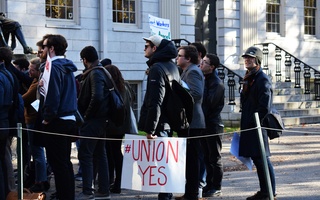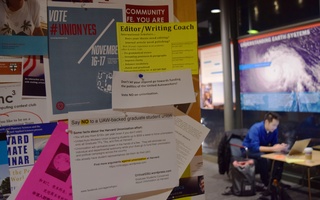Several students eligible to vote tomorrow and Thursday on the unionization effort proposed by Harvard Graduate Students Union-United Auto Workers have expressed discontent at the election’s lack of mail-in ballots. Students are limited to three in-person ballot stations scattered across campus, which they argue restricts their ability to participate in what could be a crucial vote. While the relative scarcity of voting stations is unfortunate, it is unavoidable at this juncture due to an existing agreement between HGSU-UAW and the University. Nevertheless, students’ concern underscores a broadly applicable point about the importance of the election itself.
The University and HGSU-UAW reached an agreement in Oct. 2016 to hold an election under the National Labor Relations Board’s most common procedure on the issue—one without mail-in ballots. This decision occurred before the first unionization election, and this agreement will persist for this week’s revote. On one level, any reduction of the electorate is regrettable, and this policy may render off-campus students unable to vote. However, the in-person nature of the election has been public knowledge for over a year, and the NLRB does not permit absentee ballots in these elections. This procedural reality does not necessitate change at this point in time or call into question whatever outcome results from the election.
Off-campus students’ disappointment at not being able to vote, and the lengths to which some are going to participate in the election in person, speak to a larger issue: the importance of the election itself. All eligible, available students should feel that it is then necessary for them to participate in this vote.
As undergraduates who are not eligible to vote in the election and who would thus not be represented by the proposed union, we have not felt it our place to either endorse or condemn HGSU-UAW’s unionization effort, though we have strongly supported students’ right to unionize if they so choose.
In that vein, the upcoming vote is of paramount importance to the lives of students who teach and research at Harvard now and for the foreseeable future. The direction of this vote on unionization will help define the relationship between the faculty members and administrators who direct the University’s research and teaching on a broad scale and the graduate students who are essential parts of that work. In light of this issue’s magnitude, both advocates for and critics of the unionization effort have made compelling arguments with which eligible voters should familiarize themselves.
Advocates for unionization point to a variety of benefits that they believe HGSU-UAW provides. They highlight the potential bargaining power that the union would bring towards fairer wages and more effective handling of sexual misconduct cases. They also tout the strength derived from inter-departmental unity that the union would bring. Many economic studies have demonstrated a positive effect on worker wages and welfare for those in unions. Furthermore, op-eds and letters published in The Crimson have presented arguments for the union.
In turn, those who oppose unionization have argued that a student union would jeopardize individual bargaining agency, be inaccessible compared to existing resources for graduate students, and complicate the mentorship that students receive from their advisors. They also express concern over having a single union represent the diversity of Harvard’s graduate students. Some economic studies have demonstrated little or no effect on total compensation for those in graduate student unions. Other arguments published in The Crimson’s opinion pages have also outlined further criticisms of unionization.
Students eligible to vote in the election must familiarize themselves with arguments on both sides and cast informed votes, not only with an eye to their future at the University but also to the effects that unionization would have on their peers and their successors. We hope that graduate students and the University will work amicably and effectively to address issues facing student employees after the election, regardless of whether HGSU-UAW will represent students in this endeavor.
This staff editorial solely represents the majority view of The Crimson Editorial Board. It is the product of discussions at regular Editorial Board meetings. In order to ensure the impartiality of our journalism, Crimson editors who choose to opine and vote at these meetings are not involved in the reporting of articles on similar topics.
Read more in Opinion
The Ice Queen Cometh: Women Must Rise Up to End Gender DiscriminationRecommended Articles
-
 A Hard Bargain
A Hard Bargain -
A More Perfect Union ElectionWe believe that the expenditure of Harvard's resources is the only way to ensure a fair election that is free of suspicion.
-
 Curran Details Next Steps for New Unionization Election in Email to Students
Curran Details Next Steps for New Unionization Election in Email to Students -
 Unionization Opponents Concerned By Second Election
Unionization Opponents Concerned By Second Election -
 Some Undergrad TFs Unaware of Potential Impacts of Unionization
Some Undergrad TFs Unaware of Potential Impacts of Unionization













